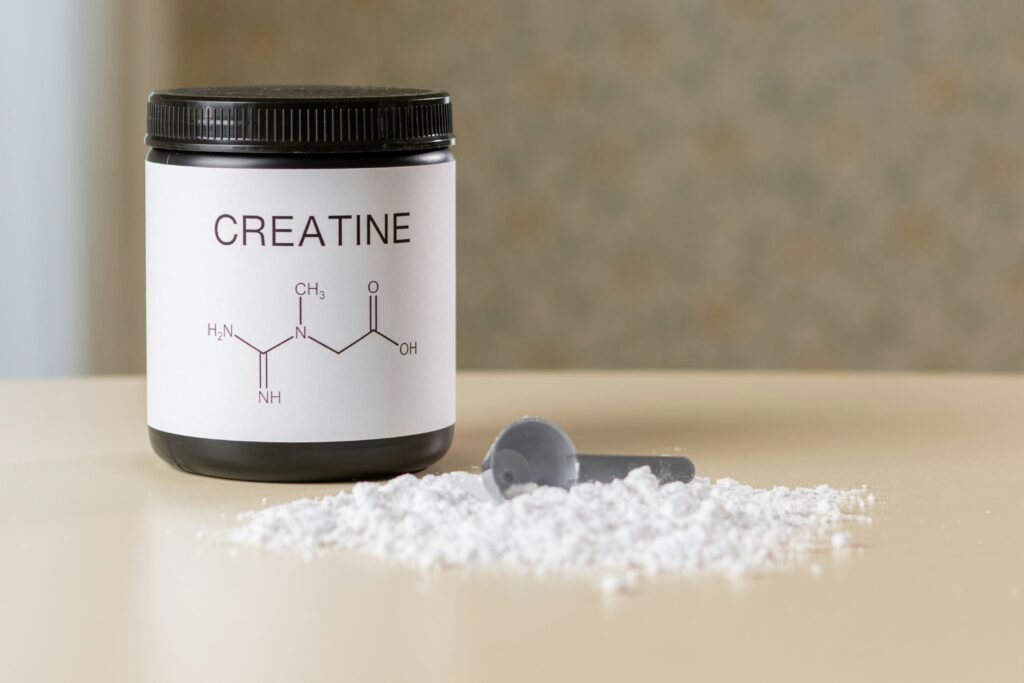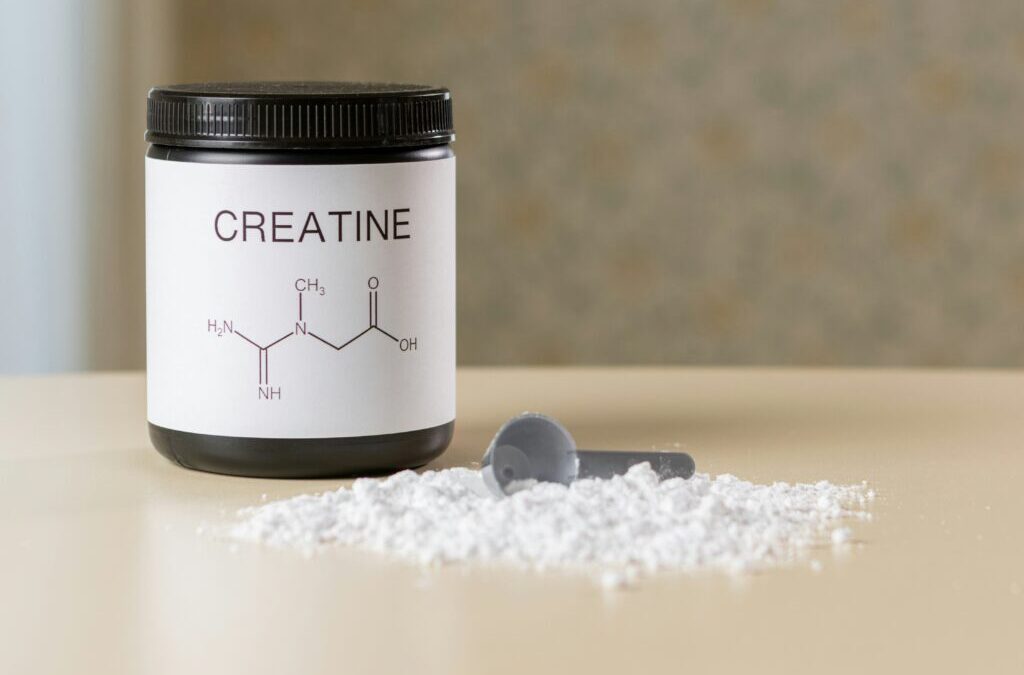
As we all know Tennis is a high-intensity, intermittent sport that demands explosive power, speed, agility, quick recovery between points, and endurance over long matches. Given these demands, many athletes turn to supplements like creatine monohydrate—one of the most researched and effective ergogenic aids available. But does it benefit tennis players? What does the latest science say about its safety, types, and effects on performance and health?
What Is Creatine?
The body synthesizes creatine from amino acids (arginine, glycine, and methionine) and obtains additional amounts from dietary sources like red meat, fish, and poultry. However, supplementation can increase muscle creatine stores by 20–40%, enhancing energy availability during high-intensity efforts
CreatineThe breakdown of creatine is a continuous process that is not regulated by enzymes. The primary breakdown product of creatine is creatinine (C4H7N3O), a waste product that is then filtered and excreted by the kidneys.
- Creatine’s Role: Creatine’s main function is to facilitate the recycling of adenosine triphosphate (ATP), the body’s primary energy currency. Within muscle cells, creatine is converted into phosphocreatine (or creatine phosphate) by the enzyme creatine kinase. Phosphocreatine acts as a high-energy phosphate buffer, rapidly donating its phosphate group to adenosine diphosphate (ADP) to regenerate ATP, especially during short, intense bursts of activity such as tennis.
- The Breakdown Process: A small percentage of the body’s creatine and phosphocreatine pool breaks down daily into creatinine. This process is a non-enzymatic cyclization reaction. The rate of this conversion is relatively constant, depending on an individual’s muscle mass.
- Creatinine and Kidney Function: Because creatinine is a waste product that is excreted by the kidneys at a fairly constant rate, its concentration in the blood and urine is a crucial indicator of kidney function. High levels of creatinine in the blood may signal that the kidneys are not filtering waste effectively.
- Chemical Reaction: The conversion of creatine to creatinine involves the loss of a water molecule (H2O) and the cyclization of the creatine molecule.
Creatine (C4H9N3O2) → Creatinine (C4H7N3O) + Water (H2O) is a naturally occurring compound produced in the liver, kidneys, and pancreas.
About 95% is stored in skeletal muscle as phosphocreatine (PCr), a critical energy source for high-intensity efforts. For tennis players, this translates to fuel for servers, sprints, and explosive directional changes. While red meat and seafood provide ~1–2g/day of dietary creatine.
How Creatine Powers Tennis Performance
During points, tennis relies on three energy systems:
- ATP-PCr system: Fuels 3–8 second sprints and serves.
- Glycolysis: Supports rallies lasting 10–45 seconds.
- Oxidative metabolism: Maintains energy during longer matches
Creatine enhances the ATP-PCr system:
As explained above ADP + Phosphocreatine → ATP + Creatine. This reaction rapidly regenerates ATP, delaying fatigue during repetitive high-intensity efforts.
For tennis, this means:
1.Better maintenance of serve velocity and power in later sets
2.Faster recovery between points
3. Improved repeat-sprint ability
Types of Creatine:
| Type | Bioavailability | Evidence in Tennis | Cost Efficiency |
| Monohydrate | High (~95%) | Most studied | Excellent |
| Hydrochloride | Moderate | Limited data | Poor |
| Liquid | Low (degrades fast) | Not recommended | Poor |
| Ethyl Ester | Unreliable | Avoid | Poor |
Note: Creatine monohydrate remains the gold standard. Its stability, absorption, and 500+ supporting studies make it ideal for athletes.
Performance Benefits:
Strength/Power: Increases maximal strength (5–15%) and power output, enhancing serve speed and overhead smashes.
Recovery: Reduces muscle damage and inflammation between matches or tournaments.
Thermoregulation: May help maintain performance in hot conditions by improving cellular hydration.
Cognitive Boost: Emerging evidence suggests improved focus and decision-making during prolonged matches.
Tennis-Specific :
A 2006 study on 36 competitive male players found no significant improvements in serving velocity, forehand/backhand speed, or repetitive sprinting after 5 weeks of supplementation. https://pubmed.ncbi.nlm.nih.gov/16720886/#:~:text=Methods%3A%20In%20a%20randomised%2C%20double,14%20creatine%2C%2010%20placebo).
This contrasts with team sports like soccer, where creatine consistently aids repeated sprints the difference in Tennis points are shorter (avg. 3–8 seconds) with adequate rest (20–25 seconds), allowing natural PCr replenishment 2.Technical skill dominates pure power in stroke effectiveness.
However, creatine may still benefit:
- Players with 2+ matches per day
- Masters athletes over 40
- Vegetarian/vegan players (lower baseline creatine)
Benefits :
Muscle Preservation: Counters Sarcopenia in aging players.
Bone Health: May reduce bone breakdown during heavy training.
Neuroprotection: Emerging role in concussion recovery.
Vegan Support: Plant-based athletes see greater performance gains due to lower baseline levels.
Safety :
Kidneys: Safe for healthy individuals but avoid if pre-existing kidney disease.
GI Distress: Loading phases (20g/day) cause bloating/diarrhea in 5–10% of users.
Weight Gain: Initial 1–2 kg increase from water retention (intracellular)
Myth-Busting:
❌ Causes baldness? No human evidence
❌ Anabolic steroid? Absolutely not.
❌ Dehydrates you? Actually, improves cellular hydration.
Age Considerations: When to Start
| Age Group | Recommendation | Key Concerns |
| <18 years | Not recommended | Unknown long-term effects; links to muscle dysmorphia in boys |
| 18–40 years | Ideal for competitive players | Monitor dosage; avoid “loading” |
| 40+ years | Highly beneficial for muscle/bone | Consult doctor if kidney issues |
Practical Protocol for Tennis Players
Dosing: Skip loading. Use 3–5g/day year-round mixed in juice/electrolyte drink (carbs enhance uptake).
Timing: Post-training or matches to support recovery.
Stack: Combine with 5g protein/carbs for maximal retention.
Hydration: Increase water intake by 500ml/day.
“For tennis, creatine’s value lies in tournament settings where recovery between matches is critical—not just raw power.” — Dr. Imtiaz Desai, Exercise Physiologist.
Why Creatine Causes Bloating in some tennis players
- Water Retention in Muscles: Creatine draws water into muscle cells to support energy production and muscle growth. This can increase total body water by 1–2 kg (2–4 lbs) during the first week, leading to a bloated appearance and digestive discomfort.
- Dosage Sensitivity: High doses (e.g., 20–25 g/day during loading) overwhelm the gut, causing osmotic effects that pull water into the intestines, resulting in diarrhea or gas – AS TENNIS PLAYERS DO NOT LOAD !
How to Minimize or Avoid Bloating
- Skip the Loading Phase: Start with 3–5 g/day to avoid rapid water retention
- Choose the Right Form: Use micronized creatine monohydrate (better solubility)
- Stay Hydrated: Drink 2–3 liters of water daily to support kidney function and reduce cramping.
- Avoid Triggers: Don’t mix creatine with carbonated drinks, high-fiber foods
- Sensitive Stomachs: People with IBS or food intolerances may experience worse symptoms
- Diet: Vegetarians/vegans (lower baseline creatine) might notice more initial water retention
Formulation Quality: Low-purity products with contaminants can worsen GI issues.
On the final note, always check with your medical doctor /Physician prior to taking creatine or any supplement. Creatine isn’t a magic bullet for tennis performance, but it offers benefits for recovery, longevity, and match-day endurance. While it won’t turn a 100km/h serve into a 120km/h , it may help you maintain 98km/h in the third set.
For vegan players, masters’ competitors, or those facing back-to-back matches, it’s a low-cost, evidence-supported tool.
3 Key Takeaways:
1.Use monohydrate, 3–5g/day, without loading.
2.Pair with carbs/protein and extra water.
3. Under 18? Focus on nutrition and skill development instead.
If you like to learn more on
Tennis Fitness https://www.amazon.com/tennis-fitness/dp/1492867969
Tennis Wellness & Performance https://www.amazon.com/dp/B0DPL48X51
Latest Research (2024–2025)
Non-Responders – About 20–30% of people see minimal benefits due to genetics or already high baseline creatine levels.
Vegans/Tennis Players – Those with low dietary creatine intake (e.g., plant-based athletes) may experience greater performance improvements.
Combined with Carbs/Protein – Taking creatine with carbohydrates or protein enhances muscle uptake.
Mental Fatigue & Focus – New studies suggest creatine may reduce mental fatigue during prolonged matches.
References & Further Reading:
- Pluim, B. M., et al. (2006). The effects of creatine supplementation on selected factors of tennis specific performance. British Journal of Sports Medicine, *40*(6), 507–512.
https://doi.org/10.1136/bjsm.2005.022558 - Kreider, R. B., et al. (2021). Creatine in health and disease. Nutrients, *13*(2), 447.
https://doi.org/10.3390/nu13020447 - Kreider, R. B., et al. (2025). Creatine supplementation is safe, beneficial throughout the lifespan, and should not be restricted [Opinion]. Frontiers in Nutrition, *12*, 1578564.
https://doi.org/10.3389/fnut.2025.1578564 - Kreider, R. B., et al. (2021). Creatine for exercise and sports performance, with recovery considerations. Nutrients, *13*(6), 1915.
https://doi.org/10.3390/nu13061915 - Antonio, J., et al. (2025). Analysis of the prevalence of reported side effects in creatine supplementation studies. Journal of Dietary Supplements, *22*(Suppl 1), 2488937.
https://doi.org/10.1080/15502783.2025.2488937 - Kreider, R. B., et al. (2017). International Society of Sports Nutrition position stand: Safety and efficacy of creatine supplementation in exercise, sport, and medicine. Journal of the International Society of Sports Nutrition, *14*, 18.
https://doi.org/10.1186/s12970-017-0173-z - Ranchordas, M. K., et al. (2013). Nutrition for tennis: Practical recommendations. Journal of Sports Science and Medicine, *12*(2), 211–224.
https://www.jssm.org/jssm-12-211.xml-Fulltext - Cleveland Clinic. (2023). Creatine: What it does, benefits, supplements & safety.
https://my.clevelandclinic.org/health/treatments/17674-creatine - Mayo Clinic. (2020). Creatine: Overview, safety, and interactions.
https://www.mayoclinic.org/drugs-supplements-creatine/art-20347591 - Kreider, R. B., et al. (2021). Creatine for Exercise and Sports Performance, with Recovery Considerations. Nutrients, *13*(6), 1915.
https://doi.org/10.3390/nu13061915 1 - The Guardian. (2025). Athletes and Fitness Influencers Use Creatine, but What Is It? And Does It Work?
https://www.theguardian.com/wellness/2025/may/15/what-is-creatine-benefits-drawbacks 2 - Kreider, R. B., et al. (2025). Creatine Supplementation Is Safe, Beneficial Throughout the Lifespan, and Should Not Be Restricted. Frontiers in Nutrition, *12*, 1578564.
https://doi.org/10.3389/fnut.2025.1578564 310 - Kreider, R. B., et al. (2021). Creatine in Health and Disease. Nutrients, *13*(2), 447.
https://doi.org/10.3390/nu13020447 4 - Pluim, B. M., et al. (2006). The Effects of Creatine Supplementation on Selected Factors of Tennis-Specific Performance. British Journal of Sports Medicine, *40*(6), 507–512.
https://doi.org/10.1136/bjsm.2005.022558 6 - Antonio, J., et al. (2025). Analysis of the Prevalence of Reported Side Effects in Creatine Supplementation Studies. Journal of Dietary Supplements, *22*(Suppl 1), 2488937.
https://doi.org/10.1080/15502783.2025.2488937 7 - Cooper, R., et al. (2012). Creatine Supplementation with Specific View to Exercise/Sports Performance: An Update. Journal of the International Society of Sports Nutrition, *9*, 33.
https://doi.org/10.1186/1550-2783-9-33 8 - Kreider, R. B., et al. (2025). Creatine Supplementation Is Safe, Beneficial Throughout the Lifespan, and Should Not Be Restricted [Opinion]. Frontiers in Nutrition.
https://www.frontiersin.org/journals/nutrition/articles/10.3389/fnut.2025.1578564/full 10 - Antonio, J., et al. (2021). Common Questions and Misconceptions About Creatine Supplementation: What Does the Scientific Evidence Really Show? Journal of the International Society of Sports Nutrition, *18*, 13.
https://doi.org/10.1186/s12970-021-00412-w 11 - Kreider, R. B., et al. (2017). International Society of Sports Nutrition Position Stand: Safety and Efficacy of Creatine Supplementation in Exercise, Sport, and Medicine. Journal of the International Society of Sports Nutrition, *14*, 18.
https://doi.org/10.1186/s12970-017-0173-z 12


